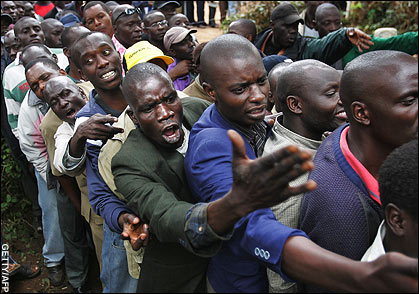Most of the big hitters in the forthcoming Kenyan election have already submitted their nomination papers to the Independent Electoral Boundaries Commission (IEBC), the body in-charge of the 2013 general elections. The noise from politicians and their hordes of followers and the money that follows the campaign trail is giving the country an atmosphere of fever and pandemonium. The stage is set, the CORD (Coalition of Reform and Democracy) coalition of Messer; Raila, Kalonzo and Wetengula and the Jubilee coalition of Messer; Uhuru Kenyatta and William Ruto are poised for the most epic political battles in Kenya’s contemporary political history.
The two coalitions are apparatuses of convenience; any attempt at window dressing the core of their very foundations is a fruitless undertaking. The Cord coalition under the tutelage of Raila Odinga, Kenya’s current prime-minister and Kalonzo Musyoka, Kenya’s current vice-president are running on a platform of pro-equity, pro-poor, and an address of historical injustices. Their clarion call of justice, especially with regards to land justice finds resonance with many landless Kenyans. Indeed a major sticking point is that Uhuru Kenyatta’s father; Jommo Kenyatta, Kenya’s founding president amassed immorally large tracts of land for; self and family when he was president. The Kenyatta family owns entire Districts and the squatters that live in them.
Earlier this week the CORD coalition launched its manifesto, its blueprint for its leadership in the next five years, a ten-point document which is pretty utopic. I find the launch of a manifesto very ironical; being that it is that none of our political parties identify with any ideologies. The ten-point manifesto has the following highlights; “the creation of a million jobs each year, ensuring promotion of agriculture through irrigation, reforming national police and providing security for all, people led government, poverty alleviation and reduce the cost of living, social equality, infrastructure development, quality education, focusing and improving access to maternal health care, training health care workers and improving the terms and conditions of service for healthcare workers, national reconciliation and healing.” The CORD coalition has captured the aspirations of the Kenyan people, but the document that forms their manifesto is a verbose writ that asks more questions than it answers. Very ambiguous, it is as well, how do you manufacture one million jobs within a year? What is, people led government? Does CORD have set timelines for the achievement of these goals? How much are the social freebies, say the free education to university cost the Kenyan Tax payer? Simply put, this CORD manifesto is a feeble attempt at plagiarizing the Millennium Development Goals MDGs?
The Jubilee coalition on its part launched their manifesto today in their characteristic; flamboyant and glitzy fashion. That is in keeping to their clarion call of a leadership adept and in sync with modern technology and globalization. Amazing how their launch even included Google+ hangouts. After all Jubilee are running on a platform of generational change. The glitz and the glamour do not cover up the cracks and the crevices within the document they presented. Their manifesto is anchored on the three pillars of; Unity (Umoja), Economy (Uchumi) and Openness (Uwazi).
They too have lined quite a line of freebies that they hope will deliver statehouse to them. They include; unsecured loans or free money to the youth and women, free wireless internet, amazing! Free milk to all primary school going children, it must be remembered that the Uhuru Family owns the two biggest milk processing corporations in Kenya, ring a bell? It must be remembered that the main partners of these coalitions are operating with the poignant reminder of the charges they face, of crimes against humanity at the Internationals Criminal Court (ICC) at the Hague-Netherlands.
Kenyans who attended the manifesto launches trotted back home with nothing, nothing but the promise of hope, for deep down inside they know that the political class that will make their dreams, vision and aspiration, the politicians that will deliver the Kenya we want, do not read from and in the schools of thought that these politicians in these coalitions read from. Deep down inside, Kenyan’s know that he who becomes Kenya’s president on 4 March 2013 or on 26th March if and when we go for a re-run of the presidential poll, will not be decided on who’s the best for the job of the presidency. Rather he who emerges winner at presidential election will have done a good job of organizing a platoon of tribal charges to back him up, he will have balkanized the country a big bit in doing so. But we are Kenyans, we do not take charge of our destiny, and we absolutely deserve our leaders. We are that special.
Alex Njeru is a columnist on AfricanLiberty.org



